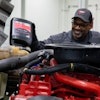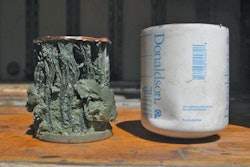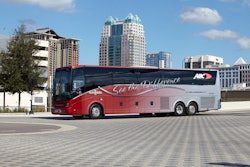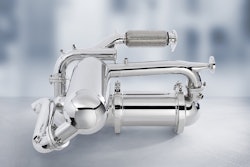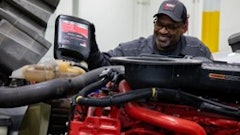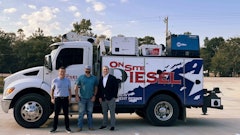In simple terms, the engine OEMs have been comfortable with existing cooling system arrangements. Engineers leaving school and heading for employment with truck/engine manufactures are educated in the use and limitations of water-based coolants and in many instances, when asked to evaluate the possibility of using a waterless coolant in their engines, they often make assumptions on what they know of about water based coolants and judge the technology based on the limitations of water.
Water has been the choice for cooling systems for over 100 years and has provided an excellent medium to transfer heat, if you keep it in its liquid state. All of today’s Truck manufacturers use giant radiators, amazingly powerful radiator fans, and high system pressures to keep the water in their cooling system beneath the boiling point of water for the pressure of the system. In many ways this is a huge waste of energy that could be better served if the OEM’s did not have to contend with the limitations of water- based coolants.
Certainly part of the problem can be attributed to the down economy. When resources are stretched and R&D budgets are reduced, many new technology programs that are not driven within the OEM’s, never seem to get the funding needed to evaluate the technology. On occasion there seems to be a NIH syndrome environment (not invented here) within some manufactures making it very difficult to gain attention for technologies outside the peripheral view of the OEM.
Most OEM’s have their own private-label products and at least one OEM has a major subsidiary producing its recommended consumables. OEMs have requirements for coolant that fit only water-based blends. In many instances OEM’s have long standing relationships ship with existing suppliers making it difficult for new suppliers outside the circle to gain traction into the industry The factor keeping the OEMs in control of coolants for their engines has been the engine warranty. The threat of engine warranty invalidation has been the club by which the OEMs control their customers. But something has changed.
The change is the economic value of fuel economy. Five-dollar diesel was a wake-up call; the price has come down but the memory persists. Fleet owners are deciding that it is not worth thousands of dollars per truck per year to keep water-based coolant cold enough to maintain functionality. They are weighing the value of their engine warranties and deciding if that value is more important than thousands per truck annually in fuel savings. On a dollars and cents basis, the fuel savings trump warranty risk (particularly since Evans waterless engine coolants, higher temperature or not, won’t harm the engine).
The OEMs will eventually come around, but Evans Cooling Systems is working with fleet owners who want these savings now, not in 5 or 10 years. In the future large fleets will be specifying equipment to be delivered with Evans HDTC in the cooling system and to be equipped with 205 F thermostats and programmed for fan-on at 230 F.
As it becomes known that engines protected with waterless coolant aren’t rusty inside, aren’t caked with baked-on coolant additives, and don’t have cylinder liners damaged by cavitation erosion, vehicle resale value will increase. Fleet owners using Evans waterless engine coolants will get premium prices when it is time to sell.

